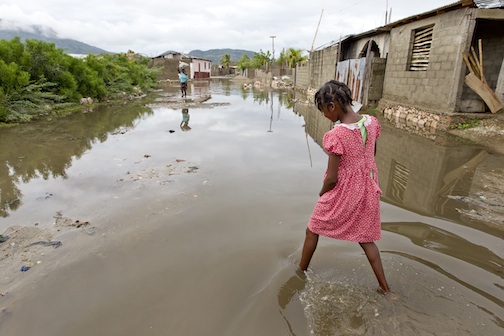Above: flooding like that during Hurricane Sandy impacted Haiti’s GDP growth this year (UN Photo/Logan Abassi)
By the Caribbean Journal staff
Real GDP growth in Haiti has slowed to 2.5 percent in 2012, down from an earlier projection that the country’s economy would grow by 7.8 percent this year, according to estimates from the International Monetary Fund.
The numbers were revealed in the fund’s statement following the conclusion of its Article IV Consultation earlier this month.
The new projection would put Haiti’s growth closer to that of the Bahamas, and good for the third-highest GDP growth in the Caribbean, not the highest as earlier projected by the fund.
Growth is still projected to accelerate to 6.5 percent in 2013,a number that would lead the region if sustained. The IMF said the projection would hold “assuming a pickup in reconstruction and a rebound in agriculture.”
A projection last month by the United Nations Economic Commission for Latin America and the Caribbean projected Haiti’s growth to finish at 6 percent this year.
The fund said that growth had slowed due to several factors: drought, the impact of Hurricane Isaac and “low execution of public capital spending.”
While the IMF said Haiti’s outlook remained “favourable,” serious downside risks remained.
“A worsening in global economic conditions, heightened domestic political and social tensions — fueled by pervasive poverty and lack of progress in improving living standards — and natural disasters could impede the fragile recovery and constrain Haiti’s growth prospects,” the fund said in its statement.
For now, Haiti’s priorities should be relocating those still living in temporary shelters (something Haiti Prime Minister Laurent Lamothe told Caribbean Journal last week that the government was aiming to complete within 18 months), rebuilding the country while maintaining macroeconomic stability and creating the conditions for “broad-based and inclusive growth.”
